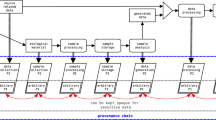Abstract
Data provenance is a process that aims to provide an overview of the origin of data used by information systems. It focuses on the origin of the data, especially on identifying the data sources and the transformations the data has undergone over time. This paper proposes a method for data collection based on the Provenance Model (PROV-DM), to be applied on Brazilian hemotherapy centers. Storing data on anemia indices using data provenance is the overall purpose of it. This work uses concepts of data provenance, knowledge provenance and scientific workflow techniques. It is an exploratory research, of practical and deductive nature, with application of a case study. Actual data was extracted from reports generated by a Brazilian hemotherapy center, provided from 2000 to 2018. People unsuitable for blood donation, who had favorable anemia rates to be rejected, were quantified and analyzed. A total of 197,551 blood donor candidates who attended the hemotherapy center in 19 years were analyzed. In the end, it was possible to quantify the unfit candidates with the highest index of anemia. A total of 1,011 male and 4,039 female candidates were accounted for, totaling 4.02% and 16.09% respectively of donors unfit for blood donations.
Access this chapter
Tax calculation will be finalised at checkout
Purchases are for personal use only
Similar content being viewed by others
References
Almeida, F.N.: Descrição da Proveniência de Dados para Extração de Conhecimento em Sistemas de Informação de Hemoterapia, p. 114 (2012). f. Tese (Doutorado) - Curso de Bioinformática, Bioinformática, Universidade de São Paulo - USP, São Paulo (2012)
Altintas, I., Berkley, C., Jaeger, E., Jones, M.: Kepler: an extensible system for design and execution of scientific workflows. In: Proceedings of 16th International Conference on Scientific and Statistical Database Management, Santorini Island, Greece, 23 June 2004, pp. 423–424. IEEE (2004)
Borko, H.: Information science: what is it? Am. Doc. 19(1), 3–5 (1968)
Bose, R., Frew, J.: Lineage retrieval for scientific data processing: a survey. ACM Comput. Surv. 37(1), 1–28 (2005)
Buneman, P., Khanna, S., Wang-Chiew, T.: Why and where: a characterization of data provenance. In: Van den Bussche, J., Vianu, V. (eds.) ICDT 2001. LNCS, vol. 1973, pp. 316–330. Springer, Heidelberg (2001). https://doi.org/10.1007/3-540-44503-X_20
Buneman, P., Tan, W.C.: Provenance in databases: tutorial outline. In: Proceedings of ACM SIGMOD International Conference on Management of Data, Beijing, China, 11–14 Jun 2007. ACM (2007)
Capurro, R., Hjorland, B.: O conceito de informação. Perspectivas em Ciência da Informação, Belo Horizonte 12(1), 148–207 (2007)
Cuevas-Vicenttin, V., Dey, S., Wang, M.L.Y., Song, T., Ludäscher, B.: Modeling and querying scientific workflow provenance in the D-OPM. In: Proceedings of 2012 SC Companion High Performance Computing, Networking, Storage and Analysis, Washington, EUA, 10–16 November 2012, pp. 119–128. IEEE (2012)
Curbera, F., Doganata, Y., Martens, A., Mukhi, N.K., Slominski, A.: Business provenance – a technology to increase traceability of end-to-end operations. In: Meersman, R., Tari, Z. (eds.) OTM 2008. LNCS, vol. 5331, pp. 100–119. Springer, Heidelberg (2008). https://doi.org/10.1007/978-3-540-88871-0_10
Davidson, S.B., Freire, J.: Provenance and scientific workflows: challenges and opportunities. In: ACM SIGMOD International Conference on Management of Data, pp. 1345–1350 (2008)
Deelman, E., Gannon, D., Shields, M., Taylor, I.: Workflows and e-science: an overview of workflow system features and capabilities. Future Gen. Comput. Syst. 25(5), 528–540 (2009)
Genetics in Medicine: ACMG. https://www.nature.com/articles/gim2016196. Accessed 22 Sept 2019
Mendrone, A.J.R., et al.: Anemia screening in potential female blood donors: comparison of two different quantitative methods. Transfusion 49, 662–668 (2009)
Meyers, D.G.: The iron hypothesis: does iron play a role in atherosclerosis? Transfusion 40(8), 1023–1029 (2000)
Moreau, L., et al.: The open provenance model core specification (v1.1). Future Gen. Comput. Syst. 27(6), 743–756 (2011)
Moreau, L., Freire, J., Futrelle, J., McGrath, R.E., Myers, J., Paulson, P.: The open provenance model: an overview. In: Freire, J., Koop, D., Moreau, L. (eds.) IPAW 2008. LNCS, vol. 5272, pp. 323–326. Springer, Heidelberg (2008). https://doi.org/10.1007/978-3-540-89965-5_31
Moreau, L., Groth, P.: Provenance: An Introduction to PROV. Synthesis Lectures on the Semantic Web: Theory and Technology, vol. 3, no. 4, pp. 1–129. Morgan & Claypool Publishers, California (2013)
Oinn, T., Li, P., Kell, D., Goble, C.: Taverna/myGrid: aligning a workflow system with the life sciences community. In: Taylor, I.J., Deelman, E., Gannon, D.B., Shields, M. (eds.) Workflows for e-Science, pp. 300–319. Springer, London (2007). https://doi.org/10.1007/978-1-84628-757-2_19
Saracevic, T.: Ciência da Informação: origem, evolução e relações. Perspectivas em Ciência da Informação 1(1), 41–62 (1996)
Silva, P.P., Mcguinness, D.L., Mccool, R.: Knowledge provenance infrastructure. Proc. IEEE Data Eng. Bull. 25, 179–227 (2003)
Simmhan, Y.L., Plale, B., Gannon, D.: A survey of data provenance techniques. Technical report TR-618, Computer Science Department, Indiana University (2005)
Stevens, R., Zhao, J., Goble, C.: Using provenance to manage knowledge of in silico experiments. Brief. Bioinform. 8, 183–194 (2007)
Stolzfus, R.J.: Defining iron deficiency anemian public health terms: a time for reflection. J. Nutr. 131, 565S–567S (2001)
W3C: PROV-DM. http://www.w3.org/TR/prov-dm/. Accessed 21 Sept 2019
WHO. https://www.who.int/topics/anaemia/en/. Accessed 21 Sept 2019
Author information
Authors and Affiliations
Corresponding author
Editor information
Editors and Affiliations
Rights and permissions
Copyright information
© 2020 ICST Institute for Computer Sciences, Social Informatics and Telecommunications Engineering
About this paper
Cite this paper
Sembay, M.J., de Macedo, D.D.J., Lima Dutra, M. (2020). A Method for Collecting Provenance Data: A Case Study in a Brazilian Hemotherapy Center. In: Mugnaini, R. (eds) Data and Information in Online Environments. DIONE 2020. Lecture Notes of the Institute for Computer Sciences, Social Informatics and Telecommunications Engineering, vol 319. Springer, Cham. https://doi.org/10.1007/978-3-030-50072-6_8
Download citation
DOI: https://doi.org/10.1007/978-3-030-50072-6_8
Published:
Publisher Name: Springer, Cham
Print ISBN: 978-3-030-50071-9
Online ISBN: 978-3-030-50072-6
eBook Packages: Computer ScienceComputer Science (R0)




